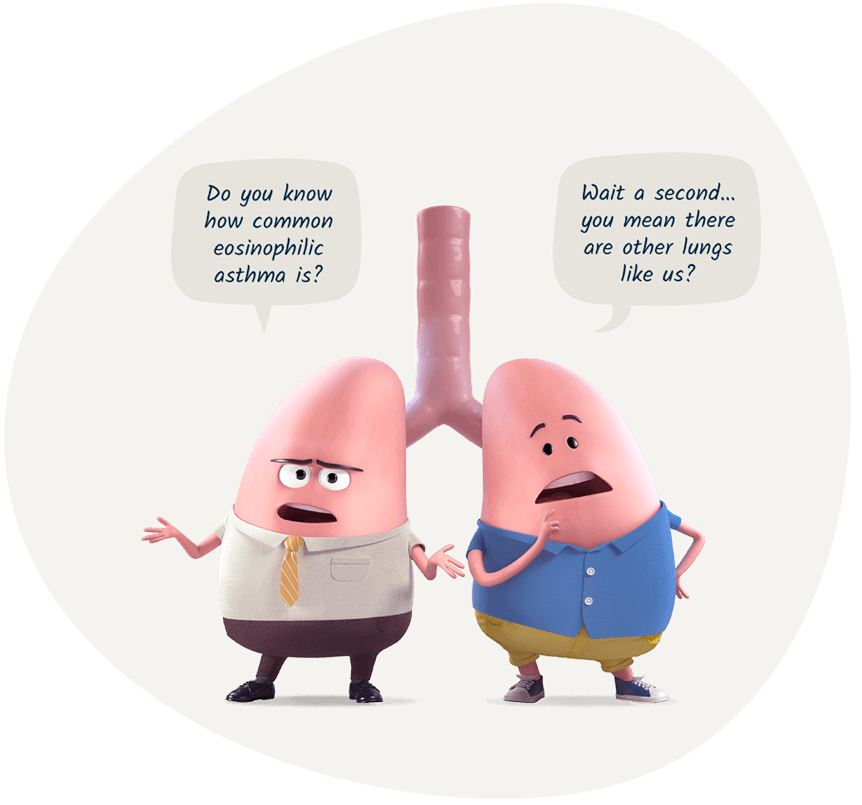
Eosinophilic asthma is a specific kind of asthma that is driven by eosinophils 1, 2
Eosinophilic asthma is a type of severe asthma. Eosinophils are white blood cells that are a normal part of the body's immune system, but in some people with severe asthma they can cause inflammation in the airways.1, 2


Inflamed airways



Severe asthma attacks



More harm to the lungs
See how eosinophils drive airway inflammation.


About 50% of people with severe asthma may have eosinophilic asthma.3
Your asthma may be poorly controlled and more severe than usual if you:4
These are signs that your asthma may be poorly controlled.
Sound familiar? It may be time to discuss these symptoms with your doctor
Asthma discussion guide
Use the asthma discussion guide to help you and your doctor have a conversation about your asthma.
There are treatment options for managing eosinophilic asthma.
If your asthma is hard to control on current treatments, a blood test may help your doctor get a better understanding of your asthma. This may help you and your doctor figure out the asthma management and treatment that’s right for you.
- Include inhaled and oral options taken daily to control asthma, even when there are no symptoms.
- Help reduce inflammation in the walls of the airways and may also work to relax the muscles in airway walls, helping to keep them open


Controller or maintenance medications
- Include inhaled medicines taken as needed for short-term relief of symptoms
- Open the lungs by relaxing the muscles of the airway wall
- Begin working within minutes and are effective for 4 to 6 hours


Rescue or quick-relief medications
- Include prednisone, and others, and can be used to prevent asthma symptoms or treat asthma attacks
- Can reverse airway inflammation
- Frequent or high doses of steroid tablets are associated with higher risks of side effects such as weight gain, high blood pressure and osteoporosis


Steroid tablets
- Include injections or infusions designed to manage specific types of asthma
- Made from complex molecules that target key cells to disrupt the pathways that lead to inflammation that causes asthma symptoms.


Respiratory biologics
Treatment of patients with severe asthma is usually indicated by a respiratory specialist, such as a pulmonologist or an allergist.
If your doctor suspects that your asthma is eosinophilic, he or she may refer you to a specialist such as a pulmonologist or allergist.

Allergists and pulmonologists can help you better understand the complexities of severe asthma.

Allergist
An allergist specialises in identifying allergies and their triggers. Once an allergy is identified, allergists can determine if a person’s allergies cause or worse asthma.

Pulmonologist
Sometimes called a "lung doctor," a pulmonologist specialises in helping people with breathing problems, like those caused by asthma, manage their condition.
Talk to your doctor,
and give your lungs a voice
Learn how eosinophilic asthma can be identified and find out if you may benefit from a referral to a specialist.
References:
- Trivedi SG, Lloyd, CM. Eosinophils in the pathogenesis of allergic airways disease. Cell. Mol. Life Sci. 64 (2007) 1269 – 1289
- De Groot JC, Ten Brinkle A, Bel EH. Management of the patient with eosinophilic asthma: a new era begins. ERJ Open Res. 2015; 1: 00024–2015
- Zhang JY, et al. Tissue and BAL based biomarkers in asthma. Immunol Allergy Clin North Am. 2007;27(4):623-32; vi.
- GINA. Global strategy for asthma management and prevention, 2020. Available at: http://www.ginasthma.org






